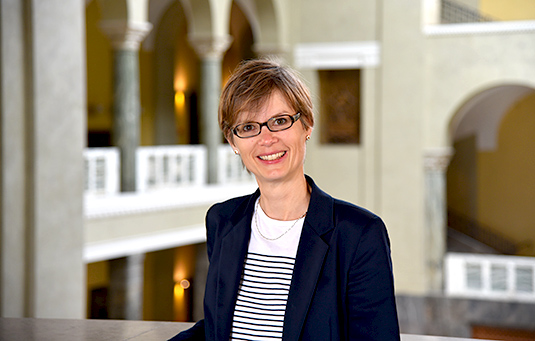In April of this year, Katrin Lohrmann took up her new position as Chair of Primary Education. Her research addresses the role of the emotions in learning and explores how the learning process can be activated and supported in childhood.

Foto: Philipp Thalhammer / LMU
"Through my research and teaching, I want to play a part in ensuring that every child gets off to a good start in school," says educationalist Katrin Lohrmann, who has held the Chair in Primary Education at LMU since April. "Research has shown how important our very first years in school are for our subsequent learning success. Every child should be able to look back on these early years in school as a time filled with positive learning experiences. Deficits in primary schooling are very difficult – if not impossible – to rectify later on.
Is primary school boring?
One of Lohrmann's major research interests focuses on the significance of the emotions for learning success. Her doctoral dissertation at Bayreuth University dealt with the role of boredom in the classroom. "I was surprised to discover that, within weeks of starting school, children in first class already talk of being bored and begin to develop strategies to cope with it. Often the course content simply doesn't get through to them." They meanwhile feel bored either because they don't find the material sufficiently challenging, or because they lose touch and can't keep up. Others complain about monotonous teaching methods, and would prefer to set their own pace. Many of them just switch off when lessons are recapitulated. "Going back over things one has recently learned and practicing their use in new contexts is an essential component of the learning process – which is why children should be actively encouraged to discover novel aspects and applications of what they have already learned."
Educational research in primary schools
Assessment of the quality of primary-school teaching is another major element of Katrin Lohrmann's research. As part of a DFG-funded project, she has studied ways of activating children's capacity for abstract thinking as a means of improving their ability to retain and apply what they had been taught in science classes. "In primary school, it is often the case that only a single example is provided to stimulate the process of abstraction. Given that children are expected to comprehend the abstract structure concerned and learn how to transfer the principle to other examples, that's not enough. In order to understand a concept such as the principle of the lever, they need more examples so that they can work out what is common to the various contexts."
Good teaching begins with what one's pupils already know. The ability of teachers to assess the level of competence already attained by their pupils is therefore a central element of learning success. "Young children come to school with very different levels of knowledge. Teachers must be aware of these ideas and notions. Otherwise they will be unable to provide the kind of support their pupils need." In the context of an interdisciplinary research collaboration, Lohrmann is now studying how trainee primary teachers pick up such diagnostic skills and how they can develop them further.
"At LMU, I have found ideal conditions for research and teaching"
Lohrmann completed teacher training and worked in primary schools before deciding on a research career. Her practical experience led her to concentrate on questions that are directly related to the process of learning under the guidance of an instructor, and she therefore addresses these questions from an empirical perspective. After obtaining her doctoral degree in 2007 at the University of Bayreuth, she worked as an academic assistant at the University of Augsburg (Chair of Primary Education). In 2010, she became Professor of Empirical Research in Education (with a Focus on Primary School Education) at the University of Education in Freiburg.
"My research is interdisciplinary in character. That is one of the reasons why I moved to Munich. LMU is ideally placed for someone like me who wishes to develop cooperative projects and collaborate in research networks." Her first few months at LMU have been full of stimulating challenges. "I'm very happy to say that lots of interesting people have been in touch with me and want to cooperate with me!"
In her new role, she says, her primary task will be to demonstrate to her students the relevance of research findings to the planning and implementation of, and reflections on, the practical side of primary teaching. "That's why it's important not to get bogged down in abstractions. Theories must be backed up with realistic examples and empirical data." Her goal is simply stated: She hopes that her students will one day be good teachers. The potential is there to be tapped. In October, some 600 first-year students are beginning their training as primary-school teachers at LMU.






